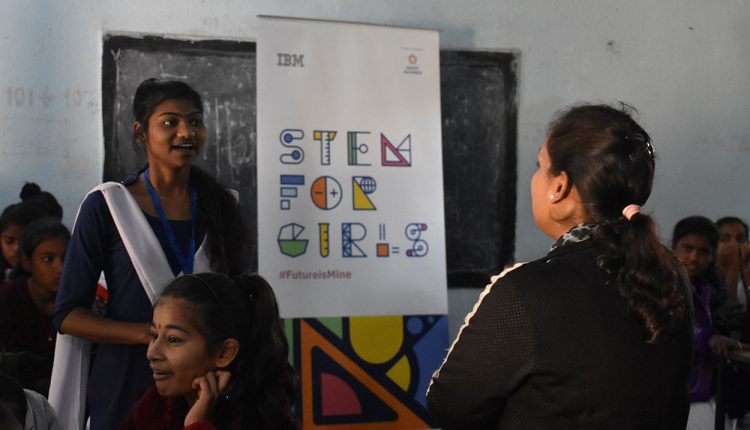‘Cultural fit & social perception stereotypes hold back girls from pursuing STEM in India’ reveals IBM and Quest Alliance report
By AakashSethi
September 22, 2020
Digital literacy and access to technology can be powerful enablers while social perceptions and cultural prejudices around gender form significant barriers to girls’ access to STEM (Science, technology, engineering, and mathematics) education, says a new white paper by Quest Alliance, supported by IBM.
The white paper titled ‘Engaging Girls in STEM: Barriers and Enablers in India’, identifies six enabling factors across the policy and implementation spectrum that could potentially boost access and interest for girls in STEM education and provide potential career pathways. These include
(a) Availability of and interaction with role models and mentors, as this could help dispel stereotypes and instill aspiration in STEM careers
(b) Growth of digital literacy
(c) Technology access for tapping into knowledge repositories like MOOCs (Massive Open Online Course) and OERs (Open educational resources)
(d) Investments in improving teachers’ capabilities
(e) Reimagining education from the perspective of promoting life preparedness, in addition to the acquisition of subject knowledge, and
(f) Targeted programmes, with a bottom-up approach
Speaking at the virtual release of the paper, AakashSethi, CEO, Quest Alliance, said, “The exponential growth of technology and digitisation heralds a future where STEM fields will be key to empower careers and futures – specially for girls. Our research outlines key enablers and barriers that policymakers and practitioners need to consider to improve access to STEM for girls, the benefits of which are far-reaching – from breaking the barriers girls face in completing formal education, to expanding the potential of youth employment to help the country face the future of work.”
The barriers to girls accessing STEM education revolve around factors such as location (urban versus rural), age, class, social/household-based factors, school system barriers, and gender perceptions, including ‘ability stereotypes’ and ‘cultural fit stereotypes’. These factors often overlap and interact in compounded ways, the paper revealed.
For instance, “unfavourable parental attitudes can lead to loss of opportunities and exposure for girls, even where they may be otherwise available,” the paper highlights. The impact of the pandemic continues to be revealed, but early indications point towards a disproportionately adverse effect on work and education for women and girls. Therefore, the paper calls for the need to re-imagine the STEM mindset in a post-Covid world.
“Research into the potential and the challenges faced by girls in the sphere of STEM education is important in consolidating existing perspectives. This paper is an important milestone that will interest government, academia and industry bodies who have a long-term vision for improving quality education and gender equality. STEM should be a mindset that needs to be inculcated, rather than as subjects that need to be taught. IBM is committed to empowering India’s women with the right skills for jobs of the future through the STEM for Girls initiative, and have partnered with ten states to train more than 200,000 girls in STEM fields,” said Manoj Balachandran, Leader, Corporate Social Responsibility, IBM India.
“Initiatives such as these build on the directives and perspectives of the National Education Policy and go a long way towards ensuring education for all,” said Bhupendra Singh Poonia, IAS, State Project Director, OSEPA, Govt of Odisha. “We encourage such initiatives that integrate technology for meaningful learning for students and teachers alike. Our learners and teachers are very bright and need learning opportunities that help them maximise their potential.”
The white paper draws on insights from in-depth conversations with over 20 academicians and members of the civil society organisations. It makes specific recommendations that can act as a guideline for organisations. These include:
A systemic push to partnerships enabling access, resources, and translation of policy into action
Finding ways to work with and help transform parents and community into key influencers Localising STEM education
Integrating STEM education in school curriculum and pedagogy with a gender lens
Teacher development to break known STEM biases
About IBM India
For more information on IBM India, please visit http://www.ibm.com/in/en.
About Quest Alliance:
Quest Alliance is a not-for-profit trust that equips young people with 21st century skills by enabling self-learning. We design scalable solutions that enable educators to address critical gaps for quality education and skills training. We facilitate learning networks and collaboration to bring about systemic change fuelled by research and innovation. (https://www.questalliance.net/)


